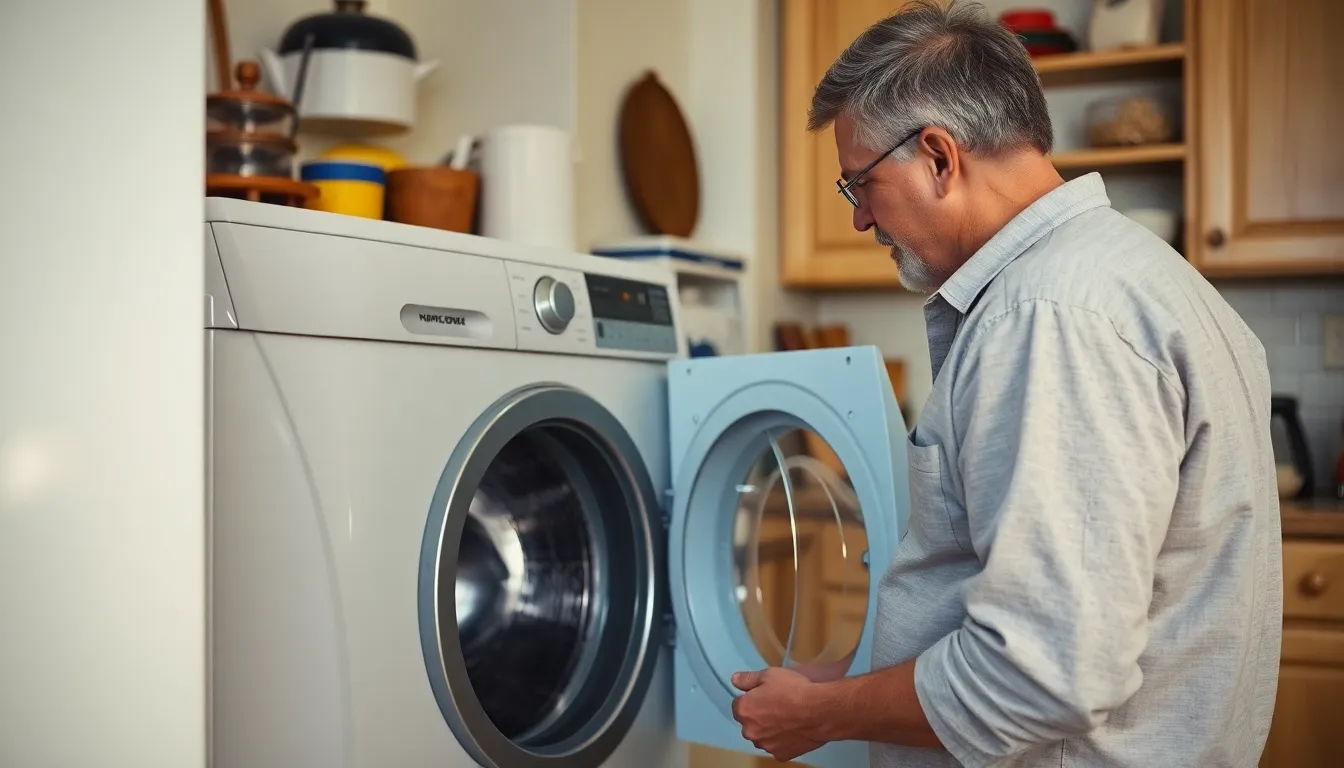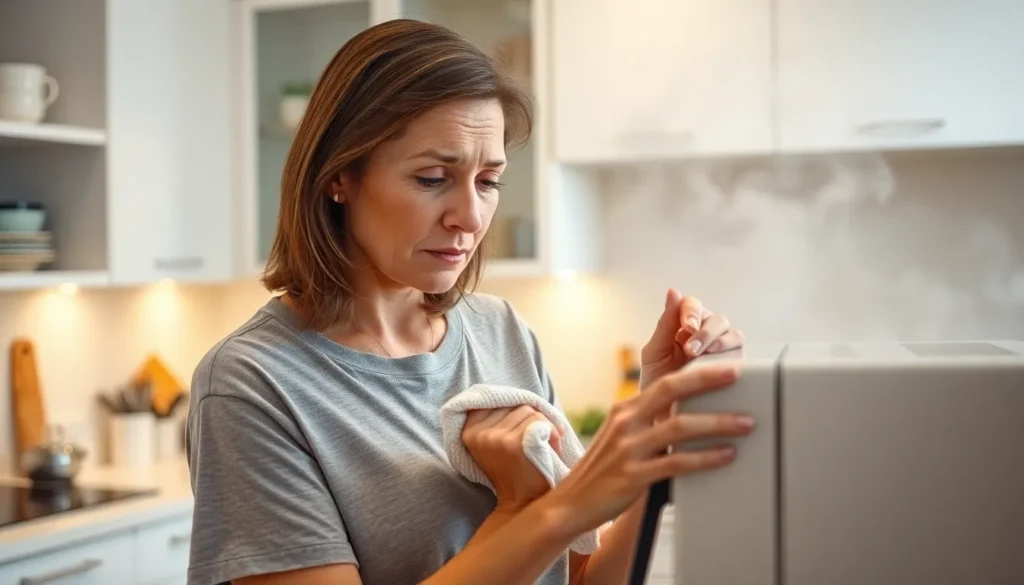Table of Contents
ToggleA burning rubber smell in the house can be alarming and often raises immediate concerns about safety. This distinct odor might signal an underlying issue that demands attention. Whether it’s the result of an electrical problem, overheated appliances, or even a malfunctioning vehicle parked nearby, understanding the source of the smell is crucial for maintaining a safe living environment.
Homeowners should act quickly when they detect this scent. Ignoring it could lead to more significant problems or even pose health risks. By identifying the cause and taking appropriate steps, they can ensure their home remains a safe haven. In this article, we’ll explore common reasons behind that burning rubber smell and provide tips on how to address the situation effectively.
Understanding Burning Rubber Smell In House
A burning rubber smell in the house often signals potential dangers that require immediate attention. Identifying the specific cause is crucial for safety and prevention.
Common Causes
- Electrical Issues: Faulty wiring, short circuits, or damaged cords can generate heat, producing a rubbery odor. Regular inspections of wiring and outlets help avoid this risk.
- Overheated Appliances: Appliances such as toasters, ovens, or microwaves can overheat, leading to a burning smell. Ensuring appliances operate correctly prevents overheating.
- Tire Storage: Storing old or defective tires indoors can emit a rubbery scent. Proper ventilation or outdoor storage of tires minimizes odor issues.
- Heating Equipment: HVAC systems or space heaters malfunctioning may release a burning rubber smell. Routine maintenance ensures these systems operate safely.
- Electrical Components: Motors, fans, or transformers malfunctioning in electronics can produce heat and odors. Inspecting these components can eliminate the risk of damage.
Potential Health Risks
- Respiratory Issues: Inhaling fumes from burnt rubber can irritate the respiratory system, leading to coughing and difficulty breathing.
- Skin Irritation: Direct contact with emissions or residue from burnt rubber can cause skin irritation or allergic reactions.
- Long-term Exposure: Prolonged exposure to the smell may result in chronic respiratory conditions or other health concerns. Immediate action reduces potential long-term impacts.
- Fire Hazard: A burning rubber odor may indicate overheating, posing a significant fire risk. Addressing the cause swiftly significantly lowers this danger.
- Electrical Shock: Ignoring signs of electrical problems not only creates odors but also increases the risk of electrical shock. Regular checks of electrical systems enhance safety.
Identifying The Source

Quickly pinpointing the source of a burning rubber smell in a house is crucial for safety. Homeowners should carefully assess appliances, heating systems, and other common items that may contribute to the odor.
Appliances and Electronics
Faulty appliances may emit a burning rubber smell due to overheating or electrical issues. Examples include:
- Refrigerators: Compressor failures can create burning smells.
- Washing machines: Malfunctioning belts or motors may cause odors.
- Dryers: Lint buildup or overheated components often produce unpleasant smells.
Inspect appliances for signs of wear or malfunction. Unplug any suspected device and consult a professional technician for repair.
Heating Systems
Heating systems, including furnaces and space heaters, can cause burning rubber odors when overheating or malfunctioning. Common causes include:
- Furnaces: Dust accumulation on heating elements can produce odors when heated.
- Space heaters: Overuse or damage may generate burning smells.
- Boilers: Malfunctioning pumps or valves can lead to unusual odors.
Regular maintenance is essential to keep heating systems functioning safely. Schedule annual inspections to prevent issues.
Other Household Items
Various household items may also cause a burning rubber smell. Potential sources include:
- Electrical cords: Damaged or frayed cords can emit odors when overheated.
- Furniture: Melting plastic components may release burning smells during high temperatures.
- Tires: Improperly stored tires can give off odors in high heat or humidity.
Thoroughly inspect all items and replace or repair any that show signs of damage or malfunction.
How To Address The Issue
Addressing a burning rubber smell in the house requires prompt action and ongoing prevention. Homeowners can take immediate actions while also implementing long-term solutions to mitigate risks.
Immediate Actions
- Identify the Source: Check appliances first. Refrigerators, washing machines, and dryers often emit smells due to overheating or electrical faults.
- Unplug Appliances: Disconnect malfunctioning appliances to prevent further issues. This step can halt potential hazards immediately.
- Inspect Electrical Systems: Look for damaged cords and outlets in the home. Frayed wires can produce burning odors and represent fire risks.
- Ventilate the Area: Open windows and use fans to disperse the odor. Improving air circulation can help reduce harmful fume inhalation.
- Contact Professionals: Seek help from electricians or appliance repair technicians if the source is not identifiable. Professionals can provide a thorough inspection.
Long-Term Solutions
- Schedule Regular Inspections: Arrange routine checks of electrical systems and appliances. Professionals can catch potential issues before they worsen.
- Maintain Appliances: Perform periodic maintenance on major appliances. Cleaning and servicing can prevent overheating and prolong their life.
- Store Tires Properly: Keep tires in a cool, dry place, away from direct sunlight. Improper storage can contribute to rubber odors and deterioration.
- Install Smoke Detectors: Ensure smoke detectors work effectively. These devices can alert homeowners to potential fire hazards associated with electrical issues.
- Educate Household Members: Train all residents on identifying unusual smells and reporting them immediately. Awareness helps in early detection and prevention.
Implementing these actions ensures a proactive approach to addressing the burning rubber smell, improving the safety and comfort of the home.
When To Seek Professional Help
Homeowners should seek professional help if the burning rubber smell persists after routine checks. Qualified electricians or appliance repair technicians can diagnose and address underlying electrical or mechanical issues.
Professional assistance is crucial when there are visible signs of smoke or burning, which may indicate imminent fire hazards. Homeowners must act quickly in such situations to mitigate risks.
Homeowners may also require specialist support if they’re unable to identify the odor’s source. Experts can conduct thorough inspections using tools and techniques that may not be available to the average homeowner.
If attempting to troubleshoot leads to confusion or heightened concern, immediate professional evaluation is advisable. This approach ensures safety and offers peace of mind.
Additionally, if significant equipment malfunctions, such as flickering lights or tripping circuit breakers, occur alongside the burning smell, professionals should evaluate the electrical system. Faulty wiring or overloaded circuits can lead to dangerous situations.
In cases where respiratory issues arise from the smell, medical attention may be necessary. Health symptoms such as coughing, wheezing, or skin irritation require prompt evaluation by healthcare providers.
Seeking professional help guarantees proper resolution of potential hazards, ensuring the safety and health of all household members.
Addressing a burning rubber smell in the home is crucial for maintaining safety and health. Homeowners must act swiftly to identify the source of the odor to prevent potential hazards. Regular maintenance and inspections can significantly reduce risks associated with overheating appliances and electrical issues.
It’s essential to stay vigilant and proactive in monitoring household items. If the smell persists or if there are concerning signs like smoke or electrical malfunctions, seeking professional help is vital. By taking these steps, homeowners can ensure a safer living environment and protect their family’s well-being.





